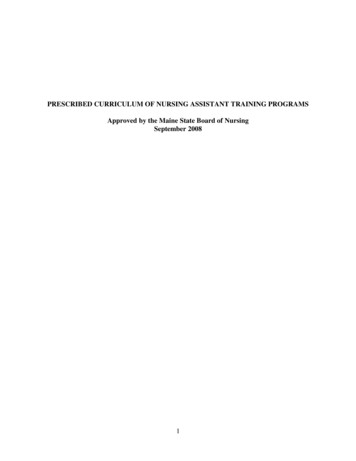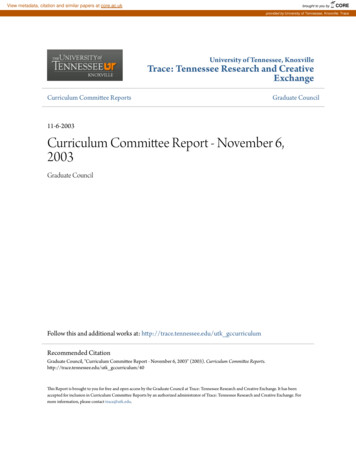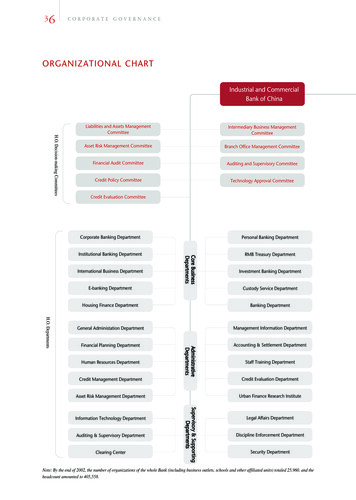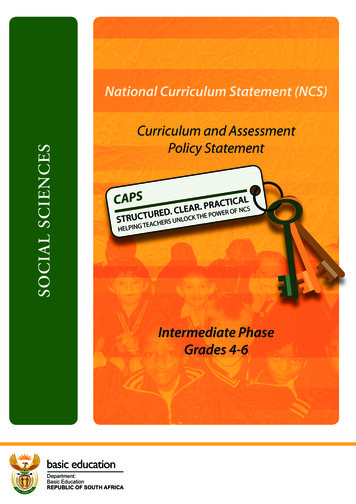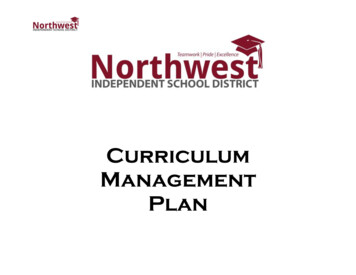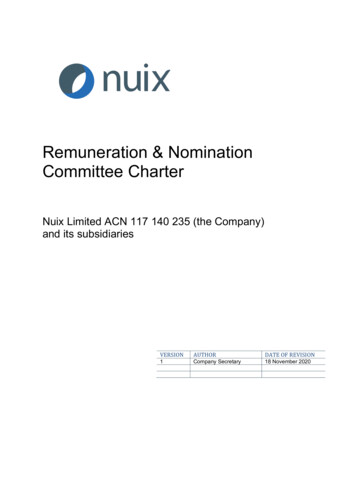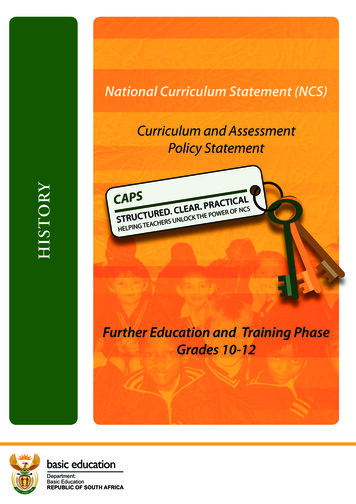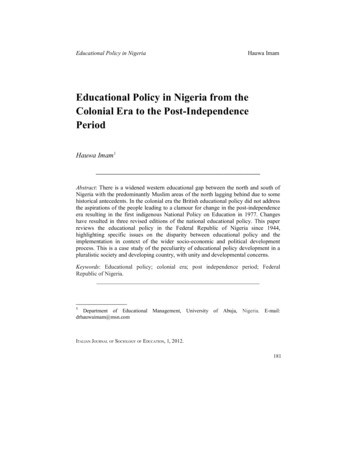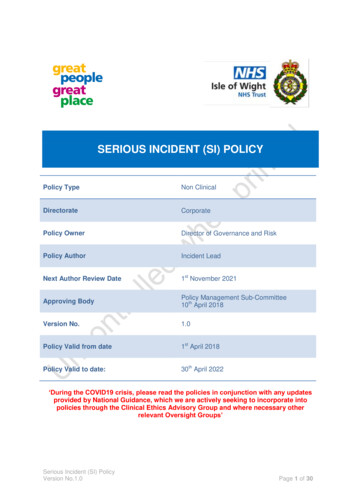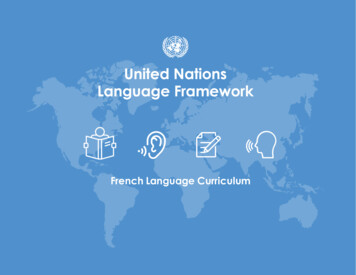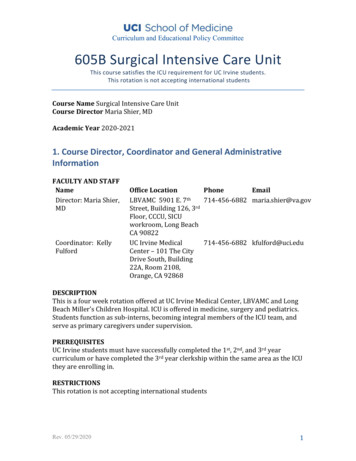
Transcription
Curriculum and Educational Policy Committee605B Surgical Intensive Care UnitThis course satisfies the ICU requirement for UC Irvine students.This rotation is not accepting international studentsCourse Name Surgical Intensive Care UnitCourse Director Maria Shier, MDAcademic Year 2020-20211. Course Director, Coordinator and General AdministrativeInformationFACULTY AND STAFFNameDirector: Maria Shier,MDCoordinator: KellyFulfordOffice LocationPhoneEmailLBVAMC 5901 E. 7th714-456-6882 maria.shier@va.govrdStreet, Building 126, 3Floor, CCCU, SICUworkroom, Long BeachCA 90822UC Irvine Medical714-456-6882 kfulford@uci.eduCenter – 101 The CityDrive South, Building22A, Room 2108,Orange, CA 92868DESCRIPTIONThis is a four week rotation offered at UC Irvine Medical Center, LBVAMC and LongBeach Miller's Children Hospital. ICU is offered in medicine, surgery and pediatrics.Students function as sub-interns, becoming integral members of the ICU team, andserve as primary caregivers under supervision.PREREQUISITESUC Irvine students must have successfully completed the 1st, 2nd, and 3rd yearcurriculum or have completed the 3rd year clerkship within the same area as the ICUthey are enrolling in.RESTRICTIONSThis rotation is not accepting international studentsRev. 05/29/20201
Curriculum and Educational Policy CommitteeCOURSE DIRECTORDr. Maria Shier is a critical care medicine specialist. She received her medical degreefrom Albany Medical College and has been in practice for more than 25 years.Kelly Fulford is the course coordinator for 605B course.INFORMATION FOR THE FIRST DAYWho to Report to on First Day: If you have questions regarding any details prior toor during your rotation, you should contact the critical care clerkship team at yourchosen site.Location/Time to Report on First Day: 7:00AM LBVAMC, Bldg. 126, 3rd floor ICUSITE: UC Irvine Medical Center, LBVA and Long Beach Miller's Children HospitalDURATION: 4 weeksScheduling Coordinator: UC Irvine students please call (714) 456-8462 to make ascheduling appointment.Periods Available: Throughout the yearNUMBER OF STUDENTS ALLOWED2-3 per rotationWHAT STUDENTS SHOULD DO TO PREPARE FOR THE COURSEClinical Responsibilities of the Student: Students function as sub-interns, becomingintegral members of the ICU team and serve as primary care givers undersupervisionPatient Care Responsibilities: Students function as sub-interns, becoming integralmembers of the ICU team and serve as primary care givers under supervisionCall Schedule of the Student: Students are expected to work the same shifts astheir team.COMMUNICATION WITH FACULTYQuestions about logistics should be directed to the Course Coordinator. Directquestions, comments, or concerns about the course can be directed to theCourse Director. Contact information and office location are at the beginning of thisdocument.The Course Director is also available to meet in person. Please emailkfulford@uci.edu to arrange an appointment. To ensure that your email will not beRev. 05/29/20202
Curriculum and Educational Policy Committeelost in the large volume of email received, please use the following convention forthe subject line:SUBJECT: COURSE NAME, your last name, your issue (e.g. XXX, Smith, Request forappointment)2. Course Objectives and Program Objective MappingThe following are the learning objectives for the 605B course. Students areexpected to demonstrate proficiency in these areas in order to satisfactorilycomplete the course. In addition, the extent of a student's mastery of theseobjectives will help guide the course evaluation and grade.Course ObjectiveMapped UCI School of SubMedicine ProgramCompetencyObjectiveAssess patients’ overall A-3. Knowledge of basic Structure andstatus – the ABC’s.clinical skills required to Function ofmeet the skillsOrgan Systemsobjectives, includinginterviewing, physicaldiagnosis,communication andclinical reasoningprocessesImprove basic skills in B-3. The ability toPatientchest radiographarticulate a cogent,Managementreview, intravenous and accurate assessmentarterial cannulation,and plan, and problemorder writing, and oral list, using diagnosticcase presentation.clinical reasoning skillsin all the majordisciplinesInterpret and manage A-2. Knowledge of the Diseasehemodynamic variables pathogenesis ofPathogenesisdiseases, interventions and Treatmentfor effective treatment,and mechanisms ofhealth maintenance toprevent diseaseRev. edgeable3
Curriculum and Educational Policy CommitteeInterpret normal andabnormal ECGs.B-5. The ability toPatientSkillfulpractice effectiveManagementpreventive medicine byidentifying, addressingand advocating forstrategies to maintainhealth and well-being, toidentify and treatdisease early whereappropriate and toadvise on lifestylepracticesA-2. Knowledge of the DiseaseKnowledgeablepathogenesis ofPathogenesisdiseases, interventions and Treatmentfor effective treatment,and mechanisms ofhealth maintenance toprevent diseaseB-5. The ability toPatientSkillfulpractice effectiveManagementpreventive medicine byidentifying, addressingand advocating forstrategies to maintainhealth and well-being, toidentify and treatdisease early whereappropriate and toadvise on lifestylepracticesAssess adequacy ofA-2. Knowledge of the DiseaseKnowledgeableventilation/oxygenation pathogenesis ofPathogenesisand treat dysfunction. diseases, interventions and Treatmentfor effective treatment,and mechanisms ofhealth maintenance toprevent diseaseB-5. The ability toPatientpractice effectiveManagementpreventive medicine byidentifying, addressingRev. 05/29/2020Skillful4
Curriculum and Educational Policy CommitteeUnderstand fluid,electrolyte, and acidbase management.Understand bloodproduct transfusionindications andconcerns.and advocating forstrategies to maintainhealth and well-being, toidentify and treatdisease early whereappropriate and toadvise on lifestylepracticesA-2. Knowledge of the DiseaseKnowledgeablepathogenesis ofPathogenesisdiseases, interventions and Treatmentfor effective treatment,and mechanisms ofhealth maintenance toprevent diseaseB-5. The ability toPatientSkillfulpractice effectiveManagementpreventive medicine byidentifying, addressingand advocating forstrategies to maintainhealth and well-being, toidentify and treatdisease early whereappropriate and toadvise on lifestylepracticesA-2. Knowledge of the DiseaseKnowledgeablepathogenesis ofPathogenesisdiseases, interventions and Treatmentfor effective treatment,and mechanisms ofhealth maintenance toprevent diseaseB-5. The ability toPatientpractice effectiveManagementpreventive medicine byidentifying, addressingand advocating forstrategies to maintainhealth and well-being, toidentify and treatRev. 05/29/2020Skillful5
Curriculum and Educational Policy Committeedisease early whereappropriate and toadvise on lifestylepracticesRecognize and manage A-2. Knowledge of the DiseaseKnowledgeableshock and shock states. pathogenesis ofPathogenesisdiseases, interventions and Treatmentfor effective treatment,and mechanisms ofhealth maintenance toprevent diseaseRecognize and managesingle and multipleorgan dysfunction.B-5. The ability toPatientSkillfulpractice effectiveManagementpreventive medicine byidentifying, addressingand advocating forstrategies to maintainhealth and well-being, toidentify and treatdisease early whereappropriate and toadvise on lifestylepracticesA-2. Knowledge of the DiseaseKnowledgeablepathogenesis ofPathogenesisdiseases, interventions and Treatmentfor effective treatment,and mechanisms ofhealth maintenance toprevent diseaseB-5. The ability toPatientpractice effectiveManagementpreventive medicine byidentifying, addressingand advocating forstrategies to maintainhealth and well-being, toidentify and treatdisease early whereappropriate and toadvise on lifestylepracticesRev. 05/29/2020Skillful6
Curriculum and Educational Policy CommitteeUnderstand inherentA-2. Knowledge of the DiseaseKnowledgeablepost-operative changes pathogenesis ofPathogenesisand problems.diseases, interventions and Treatmentfor effective treatment,and mechanisms ofhealth maintenance toprevent diseaseB-5. The ability toPatientSkillfulpractice effectiveManagementpreventive medicine byidentifying, addressingand advocating forstrategies to maintainhealth and well-being, toidentify and treatdisease early whereappropriate and toadvise on lifestylepracticesPerform sedation andA-2. Knowledge of the DiseaseKnowledgeablepain management skills. pathogenesis ofPathogenesisdiseases, interventions and Treatmentfor effective treatment,and mechanisms ofhealth maintenance toprevent diseaseB-5. The ability toPatientpractice effectiveManagementpreventive medicine byidentifying, addressingand advocating forstrategies to maintainhealth and well-being, toidentify and treatdisease early whereappropriate and toadvise on lifestylepracticesUnderstand social and C-3. Sensitivity andCultural andethical aspects ofawareness of diverseSocialcritically ill patient care cultures, health beliefs Awarenessand end-of-life issues. and social factorsRev. 05/29/2020SkillfulAltruistic7
Curriculum and Educational Policy CommitteeUnderstand ventilatormanagement andmodes.Perform ACLS.impacting patient healthand illnessA-2. Knowledge of the DiseaseKnowledgeablepathogenesis ofPathogenesisdiseases, interventions and Treatmentfor effective treatment,and mechanisms ofhealth maintenance toprevent diseaseB-5. The ability toPatientSkillfulpractice effectiveManagementpreventive medicine byidentifying, addressingand advocating forstrategies to maintainhealth and well-being, toidentify and treatdisease early whereappropriate and toadvise on lifestylepracticesA-2. Knowledge of the DiseaseKnowledgeablepathogenesis ofPathogenesisdiseases, interventions and Treatmentfor effective treatment,and mechanisms ofhealth maintenance toprevent diseaseB-5. The ability toPatientpractice effectiveManagementpreventive medicine byidentifying, addressingand advocating forstrategies to maintainhealth and well-being, toidentify and treatdisease early whereappropriate and toadvise on lifestylepracticesRev. 05/29/2020Skillful8
Curriculum and Educational Policy CommitteePerform ATLS.A-2. Knowledge of the DiseaseKnowledgeablepathogenesis ofPathogenesisdiseases, interventions and Treatmentfor effective treatment,and mechanisms ofhealth maintenance toprevent diseaseB-5. The ability toPatientpractice effectiveManagementpreventive medicine byidentifying, addressingand advocating forstrategies to maintainhealth and well-being, toidentify and treatdisease early whereappropriate and toadvise on lifestylepracticesSkillful3. Course ResourcesTEXTS AND READINGS: SUGGESTEDYour syllabus is the FCCS, the main text provided by the Society of Critical CareMedicine for medical students. You are required to study it during your 4-weekrotation, discuss any questions with your faculty. Contact Kelly Fulford,kfulford@uci.edu to collect the book at the beginning of the rotation, and make sureyou return it at the end.TEXTS AND READINGS: SUPPORTING AND REVIEW Handbook of Critical Care 3rd edition - Jesse B. Hall (September 2009) Critical Care Medicine: The Essentials 5th edition - John J. Marini and Arthur PWheeler (November 2018) The Washington Manual of Critical Care 3rd edition- Warren Isakow,Timothy J. Bedient, Marin H. Kollef, Chad A. Witt (December 2017) Irwin and Rippe's Intensive Care Medicine 8th edition - Richard S Irwin andJames M. Rippe (December 2017) The ICU Book, 4th Edition - Paul L. Marino (Octoberber 2013)Rev. 05/29/20209
Curriculum and Educational Policy Committee4. Major Exams, Assignments and GradingMAJOR ASSIGNMENTS AND EXAMSSimulation: There will be a mandatory Critical Care Simulation Session conductedfrom 1 to 4 PM at the UC Irvine Medical Education Simulation Center. It is usuallyscheduled on a Tuesday or Thursday afternoon on the 2nd or 3rd week of yourrotation. You will receive an email informing you about the exact date and time.Please make sure that you have familiarized yourself with the sections in the FCCSbook pertaining to shock, hemodynamic failure and monitoring, treatment of shockand vasopressors, causes, types and diagnosis of respiratory failure, and initiationand basics of mechanical ventilation. Familiarity with these topics will ensure thatyou have a more productive and interactive simulation session. The simulationsession is located at:Medical Education,Building 836 Irvine, CA 92697-4089Phone: 949.824.8835A map can be found at: http://www.medsim.uci.edu/contact01.htmlFor all of us, the ICU is the best ILU (Intensive Learning Unit). The diversity andintensity of pathology to which you are exposed is incomparable to any otherclinical setting. You are privileged to take care of the sickest patients in the hospital.Cherish the experience, and do your best to make the most of it.Your faculty are there to make your learning experience as meaningful and effectiveas possible. If there are problems hampering your growth, approach them. Showenthusiasm and interest; you will be taken seriously, and will witness reciprocalenthusiasm. Try to carry 2-3 patients at each time. You will learn more if you exposeyourself to a variety of pathophysiologic processes, so work with your team to tryand avoid repetitive cases. Every patient on the team is “your patient”. Pay attentionto all the patients on rounds. You will multiply your experience. Offer to do short 510 minute presentations on topics relevant to your patients. The best way to mastera topic is to teach it.GRADINGYour final grade is a composite based on your clinical evaluations, participation andinvolvement. The clinical evaluations are based on motivation, knowledge of clinicalmedicine, clinical skills, and personal characteristics. A passing grade requires dailyattendance at rounds, attendance and participation in lectures, discussions, andclinical assignments, as well as satisfactory scores for the categories listed in3/31/2016 the clinical evaluations. Absences will be excused only upon approval bythe course director. Comments may be made available for your Dean’s Letter.Students can be eligible for Honors if they receive a satisfactory score on all clinicalevaluation categories, have perfect attendance, and show exceptional skills in anumber of clinical categories and prepare a relevant presentation. Students whoRev. 05/29/202010
Curriculum and Educational Policy Committeereceive a failing grade will meet with the course director to discuss options for reevaluation that may include additional time in the ICU.Attendance: You are expected to participate as a team member, every weekday inaddition to one day every weekend, other than the last weekend. You areencouraged to take call with one of your team interns; you should coordinate thedetails regarding hours of attendance and the call schedule with your site clerkshipdirector and ICU faculty.Absence: With prior notification, you are allowed a maximum of three (3) days ofabsence during your 4-week rotation. You will need to reschedule your rotation foranother date if you miss more than 3 days.Any questions or issues regarding your critical care clerkship grade should bepresented to your course director and the grading faculty.You have 30 days from the date of the grade to appeal any aspect of thisgrade. Please contact your Clerkship/course Director should you have anyquestionsRequirements for “Pass”: To receive a grade of Pass, students must demonstratesuccessful performance in all the following areas: KnowledgePatient CarePractice-Based LearningInterpersonal & Communication SkillsProfessionalismSystems-Based PracticeRequirements for “Honors”: To receive a grade of Honors, students mustdemonstrate exceptional performance all the following areas: KnowledgePatient CarePractice-Based LearningInterpersonal & Communication SkillsProfessionalismSystems-Based PracticeGrounds for “Incomplete”: You will not be issued a grade until all elements of thecourse have been completed.REMEDIATIONRemediation, if needed will be designed by the Course Director to suit the issue athand.Rev. 05/29/202011
Curriculum and Educational Policy CommitteeGrounds for “Fail”: You will receive a grade of "Fail" if the requirements for passingthe course have not been met. Please refer to the Grading Policy for the impact ofthe "Fail" grade to the transcript.Rev. 05/29/202012
from Albany Medical College and has been in practice for more than 25 years. Kelly Fulford is the course coordinator for 605B course. . Timothy J. Bedient, Marin H. Kollef, Chad A. Witt (December 2017) Irwin and Rippe's Intensive Care Medicine 8th edition - Richard S Irwin and
